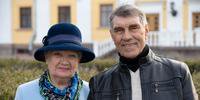The case of Suvorov in Chelyabinsk
Filter
- #
Vladimir Suvorov's house is being searched. A "gray box with a lid", religious literature, a map of Chelyabinsk, a book without a cover, and personal notes were seized from him.
- #
Alexander Chepenko, an investigator for particularly important cases of the Investigative Department of the Investigative Committee of the Russian Federation in the Chelyabinsk Region, initiates a criminal case against 74-year-old Vladimir Suvorov under the article "organization of extremist activity" (part 1 of article 282.2 of the Criminal Code of the Russian Federation). The decision to initiate the case states that Suvorov organized meetings of fellow believers, during which they prayed to Jehovah together and sang religious songs. The investigator interprets these actions as a continuation of the activities of the local religious organization of Jehovah's Witnesses "Chelyabinsk", which was liquidated after the decision of the Supreme Court to liquidate 396 legal entities of Jehovah's Witnesses in Russia.
- #
Investigator Chepenko summons Suvorov for interrogation, during which he informs the believer that he is under recognizance not to leave. Suvorov declares that he has never been engaged in extremist activities, and petitions for the termination of the criminal case in the absence of the very fact of the crime.
Earlier, the same investigator charged Vladimir's wife, 71-year-old Valentina Suvorova, with extremism.
- #
- #
Vladimir Suvorov files a motion to terminate the criminal case. In the petition, he refers to the opinion adopted by the Working Group on Arbitrary Detention of the UN Human Rights Council.
- #
Investigator Alexander Chepenko rejects Suvorov's petition to terminate the criminal case, which was filed the day before.
- #
The head of the 3rd Department for the Investigation of Particularly Important Cases of the Investigative Department of the Investigative Committee of the Russian Federation for the Chelyabinsk Region, Colonel A.A. Volkov entrusts the proceedings in this case to an investigation team consisting of 8 people, among them investigators Madjara P.A., Zavyalov A.S., Shchelokov N.A., Varshon E.I. and others. Investigator Oleksandr Chepenko is appointed head of the group. The expansion of the group is motivated by the need to perform a large number of investigative actions in a limited time.
- #
Vladimir Suvorov gets acquainted with the documents on the case. The investigator also interrogates Suvorov's wife, Valentina, as a witness. A separate criminal case had previously been initiated against her. The investigator notifies Suvorov of his intention to bring charges against him.
- #
Alexander Chepenko, an investigator of the Department for Particularly Important Cases of the Investigative Committee of the Kemerovo Region, charges Vladimir Suvorov with committing a crime under Part 1 of Article 282.2 of the Criminal Code of the Russian Federation. Vladimir is accused of continuing the activities of the local religious organization of Jehovah's Witnesses "Chelyabinsk" after its liquidation by the Supreme Court of the Russian Federation on April 20, 2017.
Despite the fact that Article 28 of the Constitution of the Russian Federation guarantees the right to freedom of religion, the investigation calls it a crime to talk to people about faith in God, hold worship services, and perform religious songs and prayers.
The investigator's decision states that Vladimir, having instructed his wife Valentina Suvorova, organized preaching activities, thereby violating the International Covenant on Civil and Political Rights of 1966.
Among other things, the believer is accused of collecting funds in the amount of 1900 rubles, and the usual storage of literature in electronic form in the indictment is called "conspiracy measures".
After the indictment, the investigator interrogates Vladimir Suvorov. The defendant explains that he considers the criminal prosecution to be repression for faith.
- #
Investigator Chepenko chooses Vladimir Suvorov a measure of restraint in the form of a written undertaking not to leave and proper behavior.
- #
Oksana Mitina, judge of the Metallurgichesky District Court of Chelyabinsk, was given the materials of the criminal case under Part 1 of Article 282.2 of the Criminal Code of the Russian Federation against Vladimir Suvorov for consideration.
- #
The court continues to consider the criminal case of Vladimir Suvorov.
Vladimir's written position on the charges against him, as well as the documents to which he refers are attached. The believer declares that he is not a criminal, and the accusation is illegal, since the Supreme Court of the Russian Federation did not ban the religion of Jehovah's Witnesses.
For Vladimir, it is obvious that any person living in the Russian Federation has the right to practice the religion of Jehovah's Witnesses, as this is written in the Constitution of the Russian Federation. According to him, being a Jehovah's Witness in Russia is not a crime and the decision of the Supreme Court does not require residents of Chelyabinsk who profess this religion to stop exercising their constitutional rights and freedoms.
In support of this, Vladimir cites the official position of the Government of the Russian Federation, which was sent to the European Court of Human Rights and other international organizations.
The judge refuses to connect the defendant's criminal case with the case of his wife Valentina, which is being considered by another judge, Grigory Yarygin.
- #
Three prosecution witnesses are being questioned. In their speeches, they confirm that Suvorov never encouraged the severance of family ties, and also did not call for undermining the foundations of the constitutional order and state security.
The testimonies of three other prosecution witnesses are read out despite the fact that they do not directly mention the defendant.
- #
A prosecution witness who has known Vladimir since childhood is being interrogated. The witness gives the defendant a positive characterization.
A review of the 12 volumes of the case is made. The conclusion of the religious examination is read out. It notes that since the name "Jehovah" is heard at worship services, and not just "God", then this is a meeting of Jehovah's Witnesses, and since Suvorov held a discussion of the Bible, he resumed the activities of an extremist organization.
- #
The final volumes of the case file are being considered. Positive characteristics of Vladimir from his place of work and from neighbors are read out.
- #
The case file shall be accompanied by a work book, a diploma, a veteran's certificate and other documents of the defendant, as well as extracts from the medical records of the Suvorov spouses.
- #
The prosecutor requests a sentence of 7 years of real imprisonment for Vladimir Suvorov.
- #
The last word of the defendant Vladimir Suvorov in Chelyabinsk - #
Judge of the Metallurgichesky District Court of Chelyabinsk, Oksana Mitina, finds the elderly believer guilty of organizing the activities of a banned organization and sentences him to 6 years of suspended imprisonment with deprivation of the right to engage in activities related to leadership and participation in the activities of religious organizations for a term of 5 years, as well as restriction of liberty for 10 months and a probationary period of 4 years.
- #
The Chelyabinsk Regional Court, with the participation of prosecutor Vladimir Makhov, is considering an appeal against the sentence to Vladimir Suvorov on charges of organizing extremist activities. The court upholds the verdict of the first instance.


